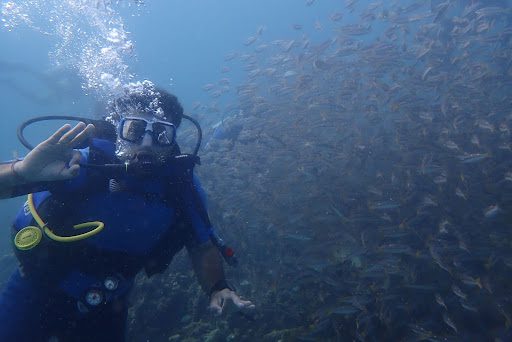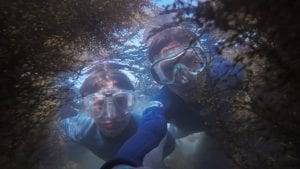
Ready to become a Divemaster? It’s a serious question and will often lead to other inquiries about the industry or its courses. In this blog, we’ll dive into a couple of common questions about what to expect.
As a Divemaster, you are responsible for organizing and leading recreational dives and supervising as a dive guide. You can also teach dive courses and complete scuba reviews.
Another opportunity as a Divemaster is that you are now qualified for the responsibility of overseeing scuba diving operations for salvages or work at a resort.
The Divemaster SCUBA diving lessons are typically very flexible and depending on one’s schedule, can be achieved in three weeks or up to six months. We have trained experts who will be able to provide one-on-one support during the lessons. Expect to learn more about theoretical concepts in the course ranging from the physics of diving to decompression theory and first aid.
When it comes to diving equipment, you want the best tools for the job. Must-haves like a snorkel, mask and dive computers should be at the top of your list. Some other diving equipment you may need to become a divemaster include:
The conditions when trying to achieve a SCUBA certification are some of the most challenging you’ll face. This is because divemasters want to help you flourish in any kind of water, so you can do the same to help your students.
Training typically occurs in a pool or in a confined area of water such as a very calm beach.
Make sure you know how to perform tasks like setting up gear, entering or exiting the water, basic underwater navigation techniques, safety and buoyancy control in any kind of water conditions.
In order to become a divemaster, you need to be 18 years or older, have at least forty (40) dives logged and successfully completed, a signed medical statement from your doctor within the past year before the course, and SCUBA certifications in Rescue Diver and Emergency First Responder courses.
Get ready to be tested on treading water for 15 minutes straight, swimming a distance of 400 meters and snorkeling for 800, and then tow a tired diver for 100 meters. Lastly, make sure you and a buddy know how to do a complete gear swap before obtaining your SCUBA diving certification.
Learning about theoretical dive situations and information will be a breeze if you’re motivated to participate and pass the test as well.
Time management, organization, good communication and patience are very important when it comes to becoming a good Divemaster. Overall, if you strive to be a role model as a dive professional then you will certainly inspire students and help them make progress.

The founder and Divemaster of Dreaming Sea Divers, John Phillips, has been passionate about SCUBA diving since he first took his Open Water Course in 2014. His experience also includes working on dive boats, fill stations and retail stores, so he’s learned a lot and is ready to assist others with fulfilling their dreams of working in the diving industry. John also is excited to meet many serious divers and turn their hobby into an enriching, fulfilling career. After all, who wouldn’t want a career that blends their passions with the ability to teach and earn an income from it all?
Dreaming Sea Divers can help you achieve your diving goals for any lifestyle, so click here to learn more about our programs.
If you’re an advanced scuba diver and have yet to take your rescue diver course, now’s the perfect time to change that. After reaching the level of Advanced Open Water diver, you may be wondering what your next big challenge could be, and this is it. The Rescue Diver Course isn’t just challenging though. It’s also a rewarding and fun experience that many advanced divers consider to be their absolute favorite course.
So, if you’re looking to continue your diving education, grow your confidence as a diver, and want to help others in the process, then consider getting your Rescue Diver Certification with a certified SCUBA instructor.
The rescue diver certification is part of the advanced scuba diver courses and is obtained by divers who have proven their diving skills are developed enough to help others in need of assistance. The rescue scuba diver course teaches divers different techniques to avoid and manage problems in the water with confidence. Once you’ve completed the course, you’ll be able to identify potential hurdles, perform dive emergency protocols, and provide first aid and rescue methods to those in need.
Some of the topics included in the rescue diver course include:
This class focuses on preparing you to be able to help yourself in the water, your buddy and fellow divers under and above the water if troubles arise. Eventually, in your diving career, you will need to perform a rescue. It could be as simple as a tired diver tow or reminding someone to inflate their BCD on the surface. This course will build habits so that when the time arises, you know what to do and how to do it to help the other diver and protect yourself in the process. You will also learn some invaluable self-rescue techniques and refresh your basic dive skills.
The key to a successful rescue course is developing your confidence as a diver. It will significantly help you in a difficult or stressful situation.

Rescues, as previously mentioned, sometimes involve giving a small amount of help to a diver that provides a big impact to their safety and comfort. Sometimes, however, divers will panic and not respond to instructions. It is our instinct to try to help someone in need but without proper training, it is possible to put yourself in harm's way and get yourself hurt while you are trying to provide aid to another diver. The Rescue Course will cover basically every scenario you may come across and teach you different ways to defensively help the other diver and get you both to safety.
The course starts with self-rescue techniques, reminding you how to remove cramps on yourself and the importance of becoming positively buoyant on the surface, for instance. We then focus on rescues from shore or the boat when it is not necessary to enter the water to help. We will then go on a dive and show you ways to deal with distress and panic underwater. Lastly, we deal with the worst-case scenario, finding a diver unconscious and not breathing underwater. It is a rigorous, exciting, and truly rewarding course. Parts of it will challenge you. Parts of it will remind you of things you've forgotten from previous courses.
Once everything in diving has become a habit to you, you’re ready to start your rescue diver certification. These habits include regularly checking your air and no decompression time without being reminded, and effortless buoyancy that you don’t have to give much thought to. Your pre-dive checks also need to be all habit and thoughtful.
Once you’ve developed confidence as a diver and have solid experience under your belt, you can enroll in the rescue diver course, I promise you won’t regret it!
Everyone should take the Open Water, Advanced Open Water, and Rescue Course. We go over some rescue techniques in the Open Water class but all of the skills covered in the Rescue Diver course cannot be covered in the OW and AOW courses. Kids, adults, men, women, people who dive once a year, and people who dive every week should all be trained in rescue not just for safety purposes, but for peace of mind as well.
Eventually, you will use your rescue skills, even if it isn’t in a dive setting. But, the more often you dive, the more often you will use the skills. It is imperative that you're trained to do them properly so as not to hurt yourself or do further harm to the other diver.
You may start the Rescue Diver Course immediately after completing an Advanced Open Water certification or as an Open Water certified diver with 40 logged dives.
Interested in expanding your dive abilities? Then connect with John at Dreaming Sea Divers today to get your rescue scuba diver certification! As a certified SDI and PADI Instructor with thousands of recorded dives on his record, John is beyond passionate about helping others develop and embrace their love for diving. He emphasizes the importance of safety and fun in his courses and is always willing to help a diver improve their skills.
See how John can help you become a better diver today!